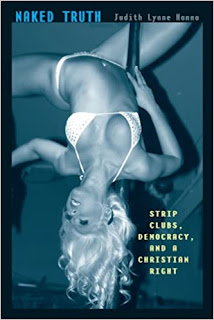Book Review: Naked Truth: Strip Clubs, Democracy, And A Christian Right, by Judith Lynne Hanna (2012, University of Texas Press)
Let me tell you why you should care about strip clubs.
Or rather, let me tell you about Judy Hanna’s new book about why should care about strip clubs.
Anthropologist
Dr. Judith Hanna is the country’s expert on strip clubs and exotic
dance. A tremendous researcher, observer, and writer, she has served as
an expert witness in over one hundred cases across the U.S.
Naked Truth is a riveting combination of news stories,
fascinating anecdote, articulate analysis, and lessons in our living
Constitution. It’s also a chilling expose of exactly how Christian Right
activists are using the issue of sexual regulation to undermine
democracy and the separation of church and state.
This parallels the very point of my 2006 book America’s War On Sex (2nd edition now available). My book
does have a few pages on exotic dance, along with swing clubs and adult
bookstores. Indeed, I consulted Hanna while writing the book’s first
edition in 2006. She was a gracious, expert source.
Naked Truth focuses entirely on
strip clubs. And with good reason: with few exceptions, just about every
American lives within 100 miles of a club. Millions of men spend
millions of hours and tens of millions of dollars at such clubs. Some
spend the rent money there.
Cities and counties also spend tens of millions of dollars attempting
to shut such clubs. Sometimes they’re successful; sometimes they
aren’t. But win or lose, these cases are never cheap, in effect spending
taxpayer money on attorneys instead of schools and hospitals.
And these cases are rarely wholesome. As
Hanna documents, attempts to constrain, close, or prevent strip clubs
are typically part of a religiously-based campaign to minimize sexual
expression in a community. And that campaign, in turn, is typically part
of a broader national movement—supposedly about enhancing morality, or
protecting women, or preventing crime, but really about increasing the
political power of the Christian Right and imposing religious doctrines
on the entire country.
Hanna exposes common myths the Christian
Right (and local law enforcement) uses to limit adults’ access to strip
clubs: clubs cause crime, they lead to sexual violence, they coerce
women into dancing, and they often involve underage dancers and audience
members. None of these four common assertions is true. In fact, to rid
themselves of strip clubs communities often write emergency ordinances
that declare these beliefs to be facts, and therefore not requiring
proof. That’s because for the most part there is none.
Whether you’re interested in stripping as
an art form (with a long and complex history), as the focus of a long
series of Constitutional cases (which Hanna describes in entertaining
fashion), or as a case study in the rise of organized religious activism
(Roe v Wade, anyone?), you’ll find this book an enjoyable, thought-provoking read.
It’s a great companion to G-Strings and Sympathy, Katherine
Frank’s 2002 book about customers’ experiences as strip club regulars.
Frank analyzes the psychological dynamics of the patrons, while Hanna
analyzes the political dynamics that restrict or prevent patrons’ access
to clubs.
Together, they make fascinating reading about an enormous subculture that mainstream society disdains—and, as Hanna documents, ferociously attacks when it can.

No comments:
Post a Comment